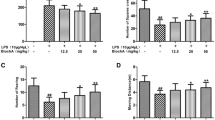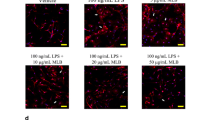Summary.
Accumulating evidence has suggested that inflammation in the brain participates in the pathogenesis of Parkinson’s disease (PD). Therefore, anti-inflammatory therapy has attracted much attention as novel interference to neurodegenerative diseases. Baicalein, a major flavonoid extracted from a traditional Chinese herb Scutellaria baicalensis Georgi (Huangqin), possesses potent anti-inflammatory and antioxidant properties. To test the potential neuroprotective effect of baicalein on dopaminergic neurons, primary midbrain neuron-glia cultures from E-14 rat embryos were used. Cultures were pretreated with baicalein for 30 min prior to stimulation with lipopolysaccharide (LPS, 10 ng/ml). LPS leads to massive activation of microglial cells revealed by OX-42 immunostaining, and produced excessive quantities of NO. Excessive elevation of superoxide level was also observed in enriched-microglia after stimulating with LPS. LPS-induced damage to dopaminergic neurons was evaluated by uptake capacity for [3H]dopamine and tyrosine hydroxylase (TH)-immunocytochemistry. Pretreatment with baicalein concentration-dependently attenuated LPS-induced decrease in [3H]dopamine uptake and loss of TH-immunoreactive (TH-ir) neurons, which the maximum protective effect was observed at the concentration of 5 µM. Post-treatment with baicalein (5 µM) was also shown to be effective even if baicalein administered up to 2 h later than LPS application. Morphological study shows that baicalein (5 µM) almost completely blocked LPS-induced activation of microglia. Excessive production of TNFα and free radicals such as NO and superoxide by LPS stimulation were also attenuated by baicalein at a concentration-dependent pattern. The present study indicates that baicalein exerts potent neuroprotective effect on LPS-induced injury of dopaminergic neurons. We hypothesize that the inhibition of LPS-induced production of NO and free radicals from microglia may underlie the mechanism of baicalein’s neuroprotection.
Similar content being viewed by others
Author information
Authors and Affiliations
Additional information
Present address: Division of Neurology, Duke University Medical Center, Durham, NC, USA
Rights and permissions
About this article
Cite this article
Li, FQ., Wang, T., Pei, Z. et al. Inhibition of microglial activation by the herbal flavonoid baicalein attenuates inflammation-mediated degeneration of dopaminergic neurons. J Neural Transm 112, 331–347 (2005). https://doi.org/10.1007/s00702-004-0213-0
Received:
Accepted:
Published:
Issue Date:
DOI: https://doi.org/10.1007/s00702-004-0213-0




